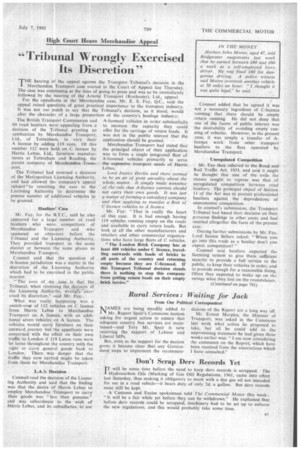High Court Hears Merchandise Appeal
Page 35

If you've noticed an error in this article please click here to report it so we can fix it.
"Tribunal Wrongly Exercised Its Discretion"
THE hearing of the appeal against the Transport Tribunal's decision in the Merchandise Transport case started in the Court of Appeal last Thursday. The case was continuing at the time of going to press and was to be immediately followed by the hearing of the Arnold Transport (Rochester), Ltd., appeal.
For the appellants in the Merchandise case, Mr. E. S. Fay, Q.C., said the appeal raised questions of great practical importance to the transport industry. It was not too much to say that the Tribunal's decision, as it stood, wonld alter the character of a large proportion of the country's haulage industry: The British Transport Commission and 60 road hauliers were appealing from a decision of the Tribunal granting an application by Merchandise Transport, Ltd., of Tottenham, to vary their A licence by adding 119 vans. Of this number 112 were held on C licence by Harris Lebus, Ltd., furniture manufacturers at Tottenham and Reading, the parent company of Merchandise Transport.
The Tribunal bad reversed a decision of the Metropolitan Licensing Authority, and had allowed the company's appeal subject"to remitting the case to the Licensing Authority to determine the , precise number of additional vehicles to be granted.
Hauliers' Case Mr. Fay. for the B.T.C., said he also appeared for a large number of road hauliers who were competitors of Merchandise Transport and who appeared as objectors before the Tribunal and the Licensing Authority. They provided transport in the same district or between the same places as Merchandise Transport.
Counsel said that the question of A-licence jurisdiction was a matter in the discretion of the Licensing Authority which had to be exercised in the public interest.
"The core of my case is that the Tribunal, when reversing the decision of the Licensing Authority, wronglyexercised its discretion," said Mr. Fay.
What was really happening was a switch-over of 112 vehicles on C licence from Harris Lebus to Merchandise Transport on A licence, with an additional seven vehicles on A licence. The vehicles would carry furniture on their outward journey but the appellants were concerned with the effect on their own traffic to London if 119 Luton vans were let loose throughout the country with the right to carry general goods back to London. There was danger that the traffic they now carried might be taken from themby Merchandise Transport.
L.A.'s Decision Counsel read the decision of the Licensing Authority and said that the finding was that the desire of Harris Lebus to employ Merchandise Transport to carry their goods was "less than genuine," and was subordinate to the wish of Harris Lebus, and its subsidiaries, to use A-licensed vehicles in order substantially to increase the capacity they could offer for the carriage of return loads. It was not in the public interest that the application should be granted.
Merchandise Transport had stated that the principal object of their application was to form a single integrated fleet of A-licensed vehicles primarily to serve they expensive transport needs of Harris Lebus.
Lord Justice Devlin said there seemed to be an air of great unreality about the whole matter. It simply made nonsense of the rule that A-licence carriers should not carry their own goods. It was just a matter of forming a subsidiary company and then applying to transfer a fleet of C-licence vehicles to A licence.
Mr. Fay: "That is really the heart of this case. It is bad enough having 119 vehicles running empty on the roads and available to carry return loads. But look at all the other manufacturers and retailers and other commercial organizations who have large fleets of C vehicles.
"The London Brick Company has at least 400 vehicles under C licence, travelling outwards with loads of bricks to all parts of the country and returning empty because they are C-licensed. If this Transport Tribunal decision stands there is nothing to stop this company from getting return loads on their empty brick lorries." Counsel added that he agreed it was not a necessary ingredient of C-licence running that there should be empty return running. He did not deny that one of the facets of public interest was the desirability of avoiding empty running of vehicles. However, in the present case, it was simply a transfer of Alicence work from other transport hauliers to the fleet operated by Merchandise Transport.
Unregulated Competition Mr. Fay then referred to the Road and Rail Traffic Act, 1933, and said it might be thought that one of the evils the statute sought to repress was that of unregulated competition between road hauliers. The principal object of Section 11 of the Act was to protect professional hauliers against the depredations of uneconomic competition.
In counsel's submission, the Transport Tribunal had based their decision on their previous findings in other cases and had omitted altogether the facts of the present case.
During further submissions by Mr. Fay, Lord Justice Sellers asked: "When you go into this trade as a haulier don't you expect competition?"
Counsel said hauliers expected the licensing system to give them sufficient security to provide a full service to the public, to keep their vehicles in order, and to provide enough for a reasonable living. Often they expected to make up on the swings what they lost on the roundabouts.




















































































































